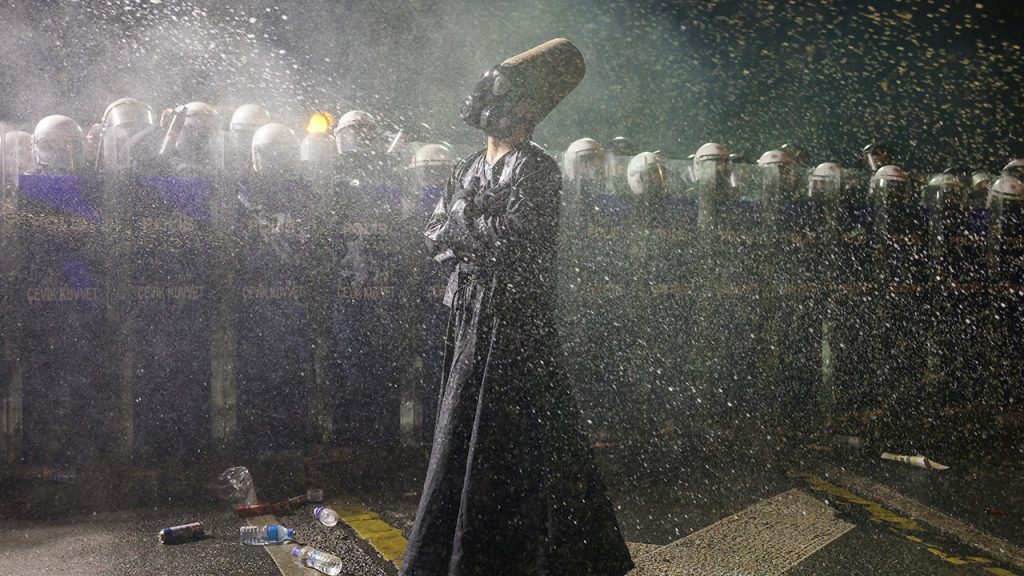In a dramatic escalation of tensions in Turkey, a Turkish court has sentenced Istanbul Mayor Ekrem Imamoglu to jail on corruption charges, prompting widespread protests across the nation. Imamoglu, a prominent opponent of President Tayyip Erdogan, is accused of establishing and leading a criminal organization, among other serious allegations. His detention, viewed by many as politically motivated, has galvanized opposition movements and sparked fierce clashes between demonstrators and police. As the government continues to assert that its legal actions are independent, thousands of people have taken to the streets, signaling a significant unrest that echoes the sentiments of earlier protests encountered in Turkey.
| Article Subheadings |
|---|
| 1) Jailing of Ekrem Imamoglu and Initial Reactions |
| 2) The Opposition’s Mobilization |
| 3) Overview of Corruption Charges |
| 4) Government’s Stance and Public Response |
| 5) Implications for Turkey’s Political Landscape |
Jailing of Ekrem Imamoglu and Initial Reactions
On March 23, 2025, Istanbul Mayor Ekrem Imamoglu was sentenced to jail by a Turkish court pending trial on serious corruption charges. This ruling has drawn significant criticism from various quarters, indicating a substantial political backlash. Many observers contend that Imamoglu’s arrest is not merely a legal matter but a strategic move to eliminate a key rival to President Tayyip Erdogan, who has dominated Turkish politics for over two decades. The court’s decision came amidst heated protests, especially among the Republican People’s Party (CHP), of which Imamoglu is a member. Eyewitness accounts describe scenes of chaos outside the courthouse, where thousands gathered in a show of solidarity with Imamoglu.
The Opposition’s Mobilization
Imamoglu’s jailing has significantly mobilized the opposition against Erdogan’s government. Following the news, members of the CHP, as well as non-party supporters, flocked to polling stations to express their solidarity. This surge of support reflects not only Imamoglu’s popularity but also a shared frustration with the government’s increasing authoritarian tendencies. The party opened non-member polling stations for what they termed “solidarity voting,” allowing all citizens, not just CHP members, to cast votes for Imamoglu as a prospective presidential candidate. The outcome of this initiative will potentially serve as a barometer for Imamoglu’s and the opposition’s standing in the run-up to future elections.
Overview of Corruption Charges
The charges against Imamoglu are extensive, encompassing allegations of establishing and leading a criminal organization, accepting bribes, embezzlement, unlawfully recording personal data, and rigging public tenders. These claims have been vehemently denied by the mayor, who has dubbed them “unimaginable accusations and slanders.” Imamoglu’s legal troubles appear to be part of a broader governmental strategy to dismantle opposition figures who pose a challenge to Erdogan’s political power. The severity of the charges places Imamoglu in a precarious position, not just for his future in politics but also for the citizens keen on justice and integrity in governance.
Government’s Stance and Public Response
In response to the mounting unrest, the Turkish government has claimed that the judiciary operates independently and that the actions against Imamoglu are not politically motivated. However, widespread public disagreement with this narrative has resulted in increased demonstrations across several major cities, leading to altercations between police forces and protesters. The government has also extended a nationwide ban on street gatherings as a means to curb the ongoing demonstrations, yet this measure seems ineffective as crowds continue to mobilize, chanting slogans in support of Imamoglu. Authorities have reported numerous detentions associated with the protests, reflecting the high-stakes confrontation between the state and dissenting citizens.
Implications for Turkey’s Political Landscape
The implications of Imamoglu’s arrest extend beyond his immediate political career. With Turkey’s general election not scheduled until 2028, this incident raises critical questions about the future of Turkish democracy and governance. Analysts suggest that Imamoglu’s popularity could present a significant electoral challenge to Erdogan should he be allowed to run. His trial is meticulously watched, as a conviction could prohibit him from holding political office, thus potentially paving the way for the government to appoint a trustee to oversee Istanbul’s administration. This situation creates a precarious balance within Turkish politics, with the opposition keenly aware that their fight for democratic principles stands at a crossroads.
| No. | Key Points |
|---|---|
| 1 | Istanbul Mayor Ekrem Imamoglu has been jailed pending trial on serious corruption allegations. |
| 2 | His arrest has galvanized significant opposition protests against President Erdoğan. |
| 3 | Imamoglu has denied all charges, claiming they are politically motivated. |
| 4 | The opposition CHP has seen a surge in support among non-party members following his jailing. |
| 5 | The unfolding events raise concerns about the future of democracy in Turkey. |
Summary
The jailing of Istanbul Mayor Ekrem Imamoglu represents a critical juncture in Turkey’s political landscape, triggering widespread protests and escalating tensions between opposition forces and the government led by President Erdoğan. As the legal machinery moves forward amidst claims of politicization, the potential consequences for Turkish democracy and future elections loom large. Imamoglu’s circumstances may not only define his fate but also shape the trajectory of political resistance against Erdoğan’s two-decade reign, emphasizing the interplay of legal action and public dissent.
Frequently Asked Questions
Question: Why was Ekrem Imamoglu jailed?
Ekrem Imamoglu was jailed pending trial on multiple corruption charges, which he claims are unfounded and politically motivated.
Question: What impact does Imamoglu’s jailing have on Turkish politics?
His arrest has unified the opposition and incited significant protests, raising concerns regarding authoritarian measures and the implications for future elections in Turkey.
Question: What charges is Imamoglu facing?
Imamoglu faces charges that include establishing and leading a criminal organization, accepting bribes, embezzlement, and rigging public tenders.


